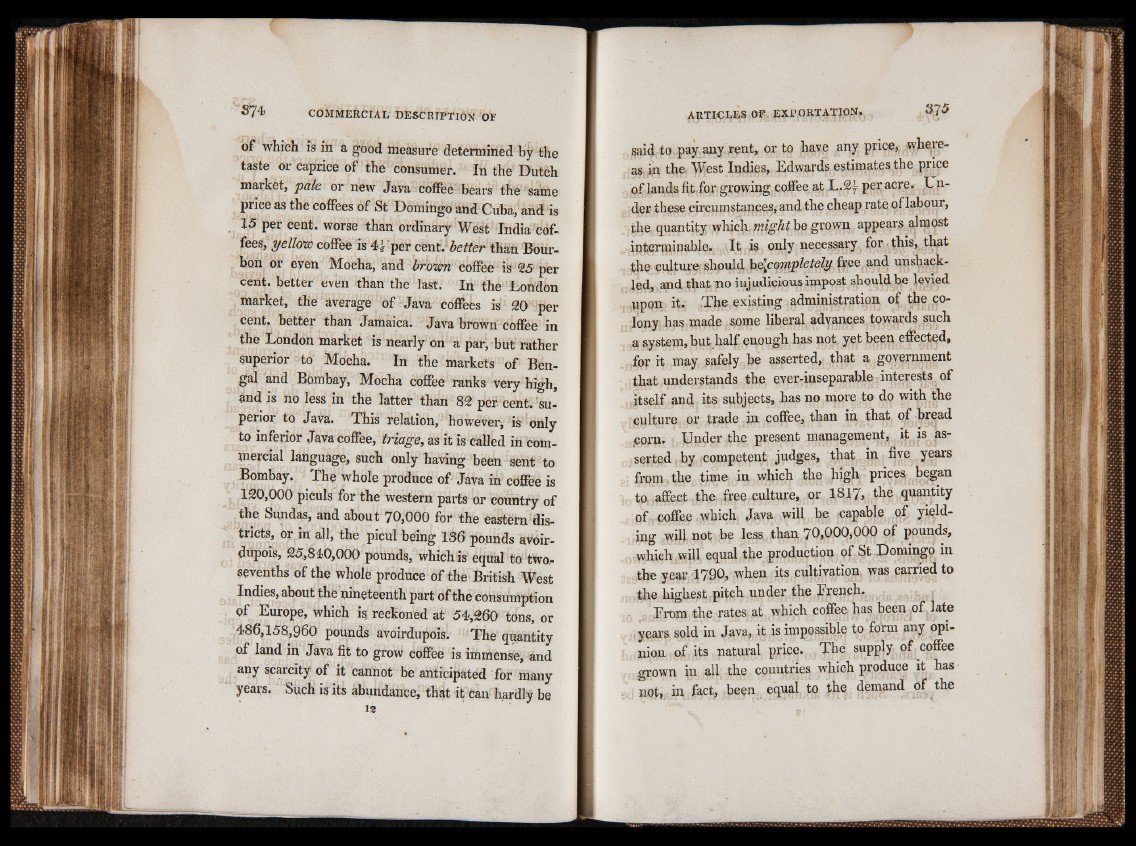
of which is in a good measure determined by the
taste 01* caprice of the consumer. In the Dutch
market, pale or new Java coffee bears the same
price as the coffees of St Domingo and Cuba, and is
15 per cent, worse than ordinary West India coffees,
yellow coffee is per cent/better than Bourbon
or eyen Mocha, and brown coffee is 25 per
cent, better even than the last. In the London
market, the average of Java coffees is 20 per
cent, better than Jamaica. Java brown coffee in
the London market is nearly on a par, but rather
superior to Mocha. In the markets of Bengal
and Bombay, Mocha coffee ranks very high,
and is no less in the latter than 82 per cent, superior
to Java. This relation, however, is only
to inferior Java coffee, triage, as it is called in commercial
language, such only having been sent to
Bombay. The whole produce of Java in coffee is
120,000 piculs for the western parts or country of
the Sundas, and about 70,000 for the eastern districts,
or in all, the picul being 136 pounds avoirdupois,
25.,840,000 pounds, which is equal to two,-
sevenths of the whole produce of the British West
Indies, about the nineteenth part 'of the consumption
of Europe, which is. reckoned at 54,260 tons, or
486,158,960 pounds avoirdupois. The quantity
of land in Java fit to grow coffee is immense, and
any scarcity of it cannot be anticipated for many
years. Such is its abundance, that it can hardly be
12
ARTIÇLES OF EXPORTATION
said to pay any rent, or to have any price, whereas
in the West Indies, Edwards estimates the price
of lands fitfor growing coffee at L.2|= per acre, lender
these circumstances, and the cheap rate of labour,
the quantity which, might be grown appears almost
interminable. It is only necessary for • this, that
the culture should h^completely free and unshackled,
and that no injudicious impost should be levied
upon it- The existing administration of the colony
has made some liberal advances towards such
a system, but half enough has not yet been effected,
for it may safely be asserted, that a government
that understands the ever-inseparable interests of
itself and its subjects, has no more to do with the
culture or trade in coffee, than in that of bread
porn. Under the present management, it is asserted
by competent judges, that in five years
from the time in which the high prices began
to affect the free culture, or 1817» the quantity
o f, coffee which Java will be capable of yielding
will not be less than 70,000,000 of pounds,
which will equal the production of St Domingo in
the year 1790, when its cultivation was carried to
the highest pitch under the French.
I ’rom the rates at which coffee has been of late
years sold in Java, it is impossible to form any opinion
of its natural price. The supply of coffee
grown in all the countries which produce it has
not, in fact, been equal to the demand of the